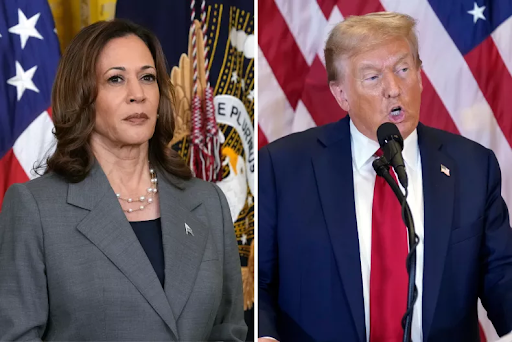- Get link
- X
- Other Apps
- Get link
- X
- Other Apps
Vice President Kamala Harris is set to visit the U.S.-Mexico border in Arizona on Friday, signaling a tougher stance on immigration than seen from most Democrats in recent history.
Immigration has become a pivotal issue ahead of the 2024 presidential election, particularly in Arizona, the only battleground state bordering Mexico. A recent poll from Redfield and Wilton Strategies found that 47% of respondents trust former President Donald Trump on immigration, compared to 36% who trust Harris. This gap, however, has been narrowing as border crossings have sharply decreased following President Biden's executive order limiting asylum claims.
Harris’s emphasis on stricter border security reflects the Democrats' strategy to continue closing the gap with Republicans on immigration policy. Shifts in public opinion also play a role, with Gallup reporting that 55% of voters, including nearly 30% of Democrats, now support stronger immigration restrictions, the highest figure since 2001.
Kamala Harris vs. Donald Trump: Immigration Policies
The immigration policies of Harris and Trump represent broader ideological divides between the Democratic and Republican parties. Immigration ranks among the top issues for the GOP, with the party emphasizing plans to secure the border in the event of a Trump victory. The Republican platform calls for an aggressive crackdown on what it describes as "open-border policies," vowing to end what it terms an "invasion" of illegal immigrants and restore law and order.
In contrast, the Democratic platform calls for comprehensive reform, emphasizing efficiency and fairness in asylum processing. It advocates for the quick removal of individuals without a legal basis to stay but stresses humanitarian exceptions for vulnerable populations, such as unaccompanied children and trafficking victims.
Trump’s policies during his presidency were centered on reducing unauthorized immigration, including constructing a partial border wall and implementing stricter asylum rules. His "zero tolerance" policy, which resulted in family separations at the southern border, was widely criticized and eventually discontinued. Trump also aimed to limit legal immigration pathways, advocating for a reduction in family-based immigration and calling for an end to protections for Dreamers—immigrants brought to the U.S. illegally as children.
hasham
In contrast, Harris supports policies that favor humanitarian protections and a path to citizenship for undocumented immigrants, including Dreamers. She advocates for modernizing legal immigration systems to address backlogs, expanding work visas, and updating family reunification programs. Harris’s approach balances border security with compassion, framing immigration as a benefit to the U.S. economy and society.
Accusations and Proposals:
Republicans have accused Harris of failing to effectively manage border security during her time as vice president, pointing to rising illegal crossings and labeling her as Biden’s “border czar.” They criticize her support for policies they describe as “amnesty,” such as a Biden administration initiative to protect undocumented spouses of U.S. citizens from deportation and allow them to work legally.
Harris has openly supported creating a pathway to citizenship for millions of undocumented immigrants. In a recent speech to the Congressional Hispanic Caucus, she reiterated her commitment to this cause, despite Republican opposition.
Trump's Perspective:
During a recent debate, Trump repeated unfounded claims that Haitian immigrants in Springfield, Ohio, were eating residents' pets, further stoking fear about immigrant criminality. Trump has promised mass deportations if reelected, though experts question the legality and feasibility of such a plan. His previous administration’s emphasis on deportations and strict enforcement measures remains a core part of his platform.
Harris, meanwhile, has backed Biden’s executive order limiting the number of asylum-seekers and supported the CBP One app, which allows migrants to schedule hearings before crossing the border. Although she opposed Trump's border wall during her 2020 presidential campaign, labeling it a "distraction," her current approach suggests a balance between enforcement and reform, aiming to both secure the border and maintain humane treatment for those seeking a better life in the U.S.
As the 2024 election approaches, immigration will remain a key issue, with Harris and Trump offering starkly different visions for the future of U.S. border policy.
- Get link
- X
- Other Apps

Comments
Post a Comment